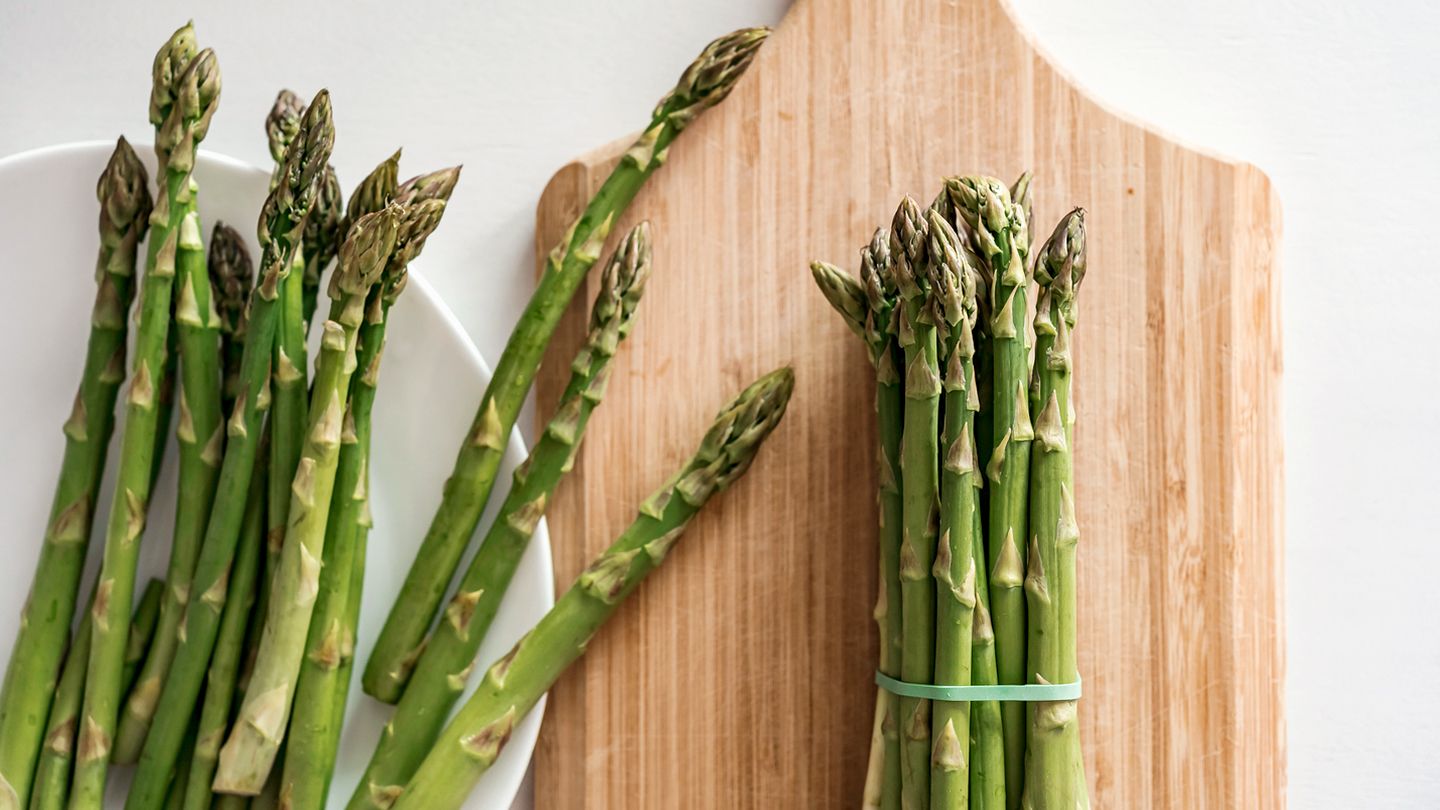An Overview of Asparagus Nutrition in 2 Cups
Two cups of raw asparagus (about 20 medium-sized spears) contains approximately:
- Calories: 40
- Net carbs: 8 grams
- Protein: 6 grams
- Fat: 0 grams
- Fiber: 6 grams
- Vitamin A: 60% DV
- Vitamin C: 40% DV
- Vitamin E: 15% DV
- Vitamin K: 120% DV
- Thiamine: 15% DV
- Riboflavin: 25% DV
- Folate: 35% DV
- Iron: 15% DV
- Potassium: 20% DV
With only 8 net grams of digestible carbs and a solid amount of protein per serving, asparagus can fit well into a keto meal plan. It also provides excellent amounts of antioxidants like vitamins A, C, E and phytonutrients such as glutathione.
Nutritional Breakdown of Asparagus
Low in Calories and Carbs
One of the key aspects of the keto diet is restricting carb intake to 20-50 grams of net carbs per day. With only 4 grams of net carbs in one cup of asparagus, it's easy to incorporate this vegetable into your daily carb limit.
Asparagus is also low in calories, with just 20 calories per cup. This makes it useful for managing your calorie intake on a weight loss diet.
High in Fiber
Getting enough fiber is crucial on low-carb and ketogenic diets to support digestive health. A cup of asparagus provides 2 grams of fiber, which is 7-8% of the daily fiber recommendation.
The fiber content combined with low net carbs gives asparagus a very low glycemic index, meaning it won't lead to blood sugar spikes.
Rich in Antioxidants
Asparagus contains various antioxidants like vitamin C, vitamin A, zinc, and selenium that can counter oxidative stress and inflammation in the body.
The antioxidant glutathione is also found abundantly in asparagus and is linked to enhanced immune defense and liver health.
Excellent Source of Vitamin K
A cup of asparagus gives you around 70% of the recommended daily intake for vitamin K, a nutrient many Americans don't get enough of.
Vitamin K improves calcium absorption, supports bone metabolism and may reduce the risk of bone fractures as you age.
Provides B Vitamins
The spectrum of B vitamins in asparagus supports converting food into cellular energy. B vitamins like folate and pyridoxine are also essential for red blood cell production and brain function.
The Many Health Benefits of Asparagus
Beyond its stellar nutrient profile, regularly eating asparagus can provide the following health perks:
Supports Heart Health
Asparagus contains vitamin K, folate and traces of iron and copper - nutrients that support normal heart function and blood circulation.
Test tube studies also indicate powerful anti-inflammatory effects that can protect blood vessels and cholesterol levels.
Can Aid Weight Loss
With minimal carbs, calories and sugars, asparagus is unlikely to contribute to weight gain. Compounds like fiber, glutathione and asparanin A found in asparagus may also aid fat breakdown and metabolism.
Replacing carb-heavy sides with asparagus is an easy way to cut unnecessary calories from your diet.
Boosts Immune Function
The nutrients in asparagus like zinc, selenium, and vitamins A, C, and E can bolster the disease-fighting capacity of our immune cells.
Glutathione is also essential for immune health and defending against pathogens and cellular damage from free radicals.
May Prevent Birth Defects
Folate is vital for healthy fetal development in pregnant women. The high folate content of asparagus can prevent dangerous neural tube defects in babies.
Can Support Liver Function
Animal studies indicate that asparagus extract may ease drug-induced liver damage. The glutathione, vitamin C, vitamin B, amino acids and minerals in asparagus also aid natural liver detoxification.
Tips for Adding More Asparagus to Your Keto Diet
Here are some simple yet delicious ways of including asparagus in your low-carb meal plan:
Sauteed Asparagus
Lightly coat chopped asparagus spears with olive oil or avocado oil and saute with garlic, salt, and pepper for a quick side dish.
Asparagus and Eggs
Make an easy breakfast skillet with eggs, asparagus, mushrooms, and onion or pair soft-boiled eggs with steamed asparagus spears.
Asparagus Salad
Throw diced raw asparagus into your favorite leafy green salad or make an asparagus slaw with shredded cabbage.
Baked Salmon and Asparagus
Bake salmon fillets with lemon and top with asparagus spears tossed in olive oil for a keto-friendly dinner.
Stir Fry with Chicken or Beef
Stir fry sliced chicken breast or beef with asparagus and other low-carb veggies like broccoli, peppers or bok choy.
Key Takeaways
With plenty of vitamins, minerals and disease-fighting antioxidants, asparagus is one of the healthiest low-carb vegetables you can eat.
Two cups provides 40 calories and 8 grams of digestible carbs along with high amounts of vitamin K, folate, vitamin C, vitamin A, glutathione and selenium.
Regularly eating asparagus can promote heart health, aid weight loss, support immune function and liver detoxification among other benefits.
Its spear-like shape allows for seamless inclusion in salads, sides, skillet dishes, bakes and stir fries.
FAQs
How many net carbs are in asparagus?
One cup of asparagus contains around 4 grams of digestible net carbs, making it easy to incorporate into a low-carb, ketogenic diet.
What vitamins and minerals are found in asparagus?
Asparagus is an excellent source of antioxidants like vitamins A, C, E and phytonutrients such as glutathione. It also provides high levels of vitamin K, folate, thiamine, riboflavin and iron.
Does asparagus have any special health benefits?
Regularly eating asparagus can help improve cardiovascular health, enhance weight loss, strengthen the immune system, prevent neural tube defects in infants, and support liver detoxification.
How can I cook asparagus on a keto diet?
Delicious ways to cook asparagus while limiting carbs include sauteing with oil and garlic, making egg dishes, adding to leafy salads, pairing with baked salmon or chicken, or stir frying it.
Disclaimer: This article is for informational purposes only and does not constitute medical advice. Always consult with a healthcare professional before starting any new treatment regimen.
Related Coverage
Equip your keto kitchen with staples like healthy fats, proteins, low carb produce and keto cookbooks. Discover meal planning strategies and must-have appliances....
Want to know if you can eat cheese on a low-carb or keto diet? Get the real truth on carbs in all types of cheese and the best low carb cheese options....
Learn how to order keto-friendly meals under 5g net carbs at Sonic Drive-In. Get tips for customizing lettuce-wrapped burgers, low-carb sides like mozzarella sticks, and diet drink options....
Discover delicious and nutritious ketogenic diet recipes perfect for women seeking to lose weight and improve health. This guide covers keto meal prep tips, essential kitchen tools, and recipes....
Stay cozy and satisfied this winter with delicious keto-friendly hot drinks like spiced tea, bone broth, hot chocolate, blended coffee, herbal tea and more....
Asparagus is a nutritious low-carb vegetable with only 8 g net carbs per serving. It provides antioxidants, vitamin K, B vitamins, and aids heart health, weight loss....
Eat keto fast food by customizing orders at chains like McDonald's, Wendy's, Burger King, Taco Bell, Subway. Get tips for low-carb burgers, chicken, salads, drinks....
Find out how many calories are in shredded part skim or whole milk mozzarella cheese per ounce or per 1/4 cup serving. Understand cheese portion sizes....
Get the scoop on the best and worst cheeses for a low carb or keto diet. Discover which high and low lactose cheeses to choose plus delicious cheese recipes....
Learn how black celebrities like Jill Scott, Halle Berry, and Sherri Shepherd have used the ketogenic diet for weight loss and to manage health conditions like diabetes....









